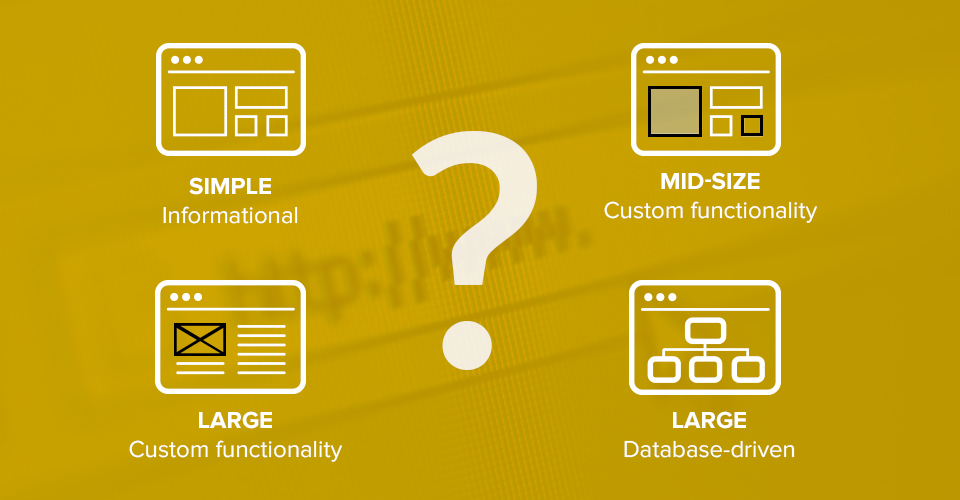How Much Does a Real Estate Website Cost in 2025?
Requesting a proposal for a new real estate website can be a daunting task because there are a multitude of options available today. Prices for real estate web development can range from very expensive to very cheap, and everything in between, making it difficult for you to understand what is an appropriate budget and what makes sense for your own business.
In this article we are going to give you a straightforward breakdown of how to properly budget for a new real estate website. Whether you need a new company website or a property website, there are several key factors that you should be aware of that will dictate the overall costs.
Key Web Development Costs
Pricing a new website depends on a few key cost factors related to the creation of the website as outlined below. Besides purchasing a domain name, the overall investment you will need to make for a new real estate website depends on the total amount of hours needed for each of the phases explained below.
1. Content Creation
Content for your website comes in many different formats and will be needed to populate the pages of your site. This can include branding assets, professional photographs, renderings, written copy and building information (floor plans, site plans, stacking charts, etc.). If you don’t have the time or capacity to provide all of this yourself, you could consider outsourcing to professionals to help get your initial content ready for your new website.
Also, if you have a section that will need ongoing updates (like a blog, news section, research, etc.), you may want to think about an ongoing agreement to help support your content creation needs.
2. Project Management
Typically, a website project is coordinated by a Project Manager who organizes the entire lifecycle of the project from start to finish. They are responsible for finalizing all client requirements, gathering all creative assets (logos, photos, fonts, etc.), establishing timelines, managing production schedules, helping define the website structure, coordinating with designers and developers, ensuring the quality of deliverables, and interfacing with clients to make sure any needs or questions are met.
3. Web Design
The design phase is a substantial part of the website creation process. It includes several critical components that have an impact on the overall aesthetic of your website, as well as user experience across all devices (desktop, mobile, tablet). Typically, this includes:
- Overall visual design
- Content layout for all pages
- Selecting color schemes
- Selecting typography
- Graphical elements (icons, buttons, etc.)
The number of total pages, visual components and complexity of custom graphics will dictate the amount of design time (and related costs) that needs to be allocated for this phase.
4. Web Development
During the development phase, the designs are converted into a clickable website prototype. The website will be fully interactive and should be functional across all different devices and browsers.
The total required development hours for a project depend on the several factors including the size of the site, interactive components and advanced functionalities. These could include:
- Property search filters
- Property details pages
- Interactive maps
- Interactive site plans
- Interactive stacking charts
- Client/investor portals
- Blogs
- Integration of 3rd party tools
5. CMS Integration
A content management system (CMS), such as WordPress, is an administrative tool that allows you to manage and make edits to the content of your website. This way you have complete autonomy to update your website on the fly without having to rely on a web developer or agency whenever you need to change something.
The costs associated with CMS integration depend on the extent/depth of the integration and whether any custom modules or plugins are required to manage any advanced components of the website.
6. Hosting & Ongoing Maintenance
After a website is launched, there are usually ongoing services required to help make sure it continues to run smoothly and ensure you are getting the most out of your site. Ongoing services could include:
- Website hosting
- Security updates and patches
- CMS and plugin updates
- Technical support
- Data back-ups
- Monthly reporting
Defining Your Requirements
Before you start a website project, it’s important to give thought to your requirements because this is what will dictate the number of hours needed for the project and therefore the total cost.
You should try to answer the following questions:
- What is the overall objective of the website?
- Do you have a general idea for the main sections of the website?
- What features do you require?
- Who will provide the content for the website?
- Does the website need to work with any 3rd party tools/platforms?
- How important is SEO (Search Engine Optimization) for you?
- What existing websites do you like?
Also, it’s worthwhile to look at the performance and key metrics of your existing website so you have a good benchmark to gauge success when you launch your new website.
Agency vs. Freelance vs. Tools
Another consideration that has a significant impact on your website cost will depend on who is going to build your website. There are many options available and just like anything else in life, you get what you pay for.
Generally, there are three realistic options to choose from:
I. Professional agency
Working with a professional agency is the best approach if you’re looking for professionalism and establishing a long-term relationship. Agencies typically will have several people working on your project which results in a more efficient development process and allows for faster updates in the future. Of course not all agencies are equal so it’s important to review their portfolio and ask about their client list before contract their commercial real estate marketing packages or services.
Pros: Broad range of experience, professionalism, efficiency, access to resources
Cons: Usually most expensive option
II. Freelance
Freelancers can usually offer more competitive costs than agencies, and that by itself is the most important decision factor for some. However, freelancers are typically only specialized in one area of the development process and don’t have proficiency in other areas. Also, a freelancer will have limitations on the number of projects he or she can work with at the same time, which can create issues if other clients have emergencies or bigger priorities than you.
Pros: Competitive costs, specialist in specific area
Cons: Less efficient, “one man show”, slower time to completion, limited ongoing support
III. DIY tools
There are plenty of generic “do it yourself” (DIY) website builders that can help you create a basic website very quickly and relatively cheap. The downside is that you will literally have to build it yourself which can waste valuable time because you will have to spend time learning how to use the product and then creating the site. Also, if you ever need to include a custom feature in the future, it’s very likely you will run into issues.
Pros: Fast, cheapest option, good for basic requirements
Cons: Time consuming to learn, limited capacity for customizations, limited personal support
Real Estate Website Prices

So how much does a real estate website cost? This depends on all the factors stated above including size, complexity and who is going to develop the website. Typically, if you work with a professional web development agency, you can expect a total investment in the range of $5,000 – $15,000 unless you have a very large, complex website.
Average ranges for professional custom websites:
Simple (informational)
$5,000 – $8,000
For a basic professional website that is relatively small (less than 10 pages) and doesn’t require many custom interactive features.
Mid-size (custom functionality)
$9,000 – $15,000
For a mid-size website (10-50 pages) that requires interactive features, advanced CMS modules, custom property search filters and property details pages.
Large (custom functionality)
$16,000 – $30,000
Large corporate website (50+ pages) that requires interactive features, advanced CMS modules, custom property search filters and property details pages.
Large (database-driven)
$31,000 – $100,000
Large database-driven website that has very complex requirements and needs development of a completely customized back-end and content management system to power the site.



